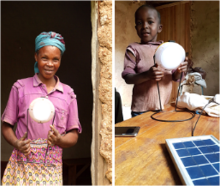Improving rural energy supply (EnDev)
Project description
Title: Energising Development Rwanda (part of the three-country programme for Rwanda, Burundi and DR Congo)
Commissioned by: German Federal Ministry for Economic Cooperation and Development (BMZ); Directorate-General for International Cooperation of the Dutch Ministry of Foreign Affairs (DGIS); Norwegian Ministry of Foreign Affairs (MFA); UK Foreign Commonwealth and Development Office (FCDO); Swiss Agency for Development and Cooperation (SDC) and Swedish International Development Cooperation Agency (SIDA), United States Agency for International Development’s (USAID) Power Africa
Country: Rwanda
Lead executing agency: Ministry of Infrastructure (MININFRA); Rwanda Energy Group (REG); Energy Development Corporation Ltd. (EDCL)
Overall term: 2009 to 2022

Context
Access to energy is one of the main challenges facing Rwanda. Only half its population has access to electricity, and the proportion is significantly lower in rural areas. Domestic electricity costs are among the highest in the region. Many rural households and companies rely on candles, kerosene, battery-run lamps and diesel generators, and use inefficient fuelwood technologies for cooking – with negative environmental and health impacts.
The government has set itself the target of supplying the entire population with electricity by 2024. Half of this is to be achieved via connection to the grid and half via local off-grid electricity generation. The government is also aiming to halve the number of households that cook on inefficient stoves.
Objective
The Rwandan Government achieves its energy supply targets and gives the entire population access to electricity.
Approach
Private sector participation in hydropower projects
Hydroelectric power has been an important part of the project since as long ago as 2006. By involving the private sector, the project aims to increase the expertise of private-sector power station developers. Companies receive technical advice, training and financial assistance to support them in developing micro-hydropower plants. The project is also assisting the government in developing a regulatory framework that promotes private investment.
Solar home systems, village grids and grid densification
In 2014, the project launched an innovative results-based financing mechanism in Rwanda. This established incentives for private-sector companies to supply electricity through solar home systems, village grids and grid densification. The funding consists of grants that are disbursed after previously defined results have been achieved, rather than at the outset. This approach fosters competition and ownership on the part of the companies and reduces the risk for the donor.
Better cooking energy solutions
The project supports the market for improved cookstoves that reduce the use of fuelwood by at least 40 per cent. It uses information and publicity campaigns to stimulate demand for efficient stoves. At the same time, technical and commercial training for production cooperatives and companies is helping to improve products and services. Networks are being created between manufacturers and retailers. The project’s market-led approach avoids direct subsidies for cookstoves and instead focuses on promoting sustainable change.
Results
Hydropower
The project has been promoting the growth of an active private sector since 2006. At that time there were no private-sector companies in the micro-hydropower industry in Rwanda. Today there are more than 30 Rwandan and international companies in the field. Better environmental standards and approval procedures have also been introduced. Rwandan financial institutions are now financing the operators of micro-hydropower plants. Rwanda’s first three privately operated micro-hydropower plants have joined the grid with a total output of 1 megawatt and are supplying 20,000 people with electricity. Four further plants are under development.
Solar home systems
Since 2014, the project has provided financial support for 140,997 solar home systems and solar lamps, reaching 553,139 people. The market has matured significantly and more than 20 solar companies are now operating in Rwanda. Since 2019, while continuing to pursue its market-led approach in the solar sector, the project has intensified its support for the poorest households.
Village grids
Three companies received support in developing one micro-hydropower grid, 78 DC nano-grids and one AC mini-grid. A successful partnership has been launched with the Rwandan Renewable Energy Fund, in order to provide initial financing to village grid developers before the grants from the results-based financing mechanism are paid out. Further projects are under development.
Grid densification
In 2019-2020 a total of 14,800 households were connected to the electricity grid as a result of grid densification.